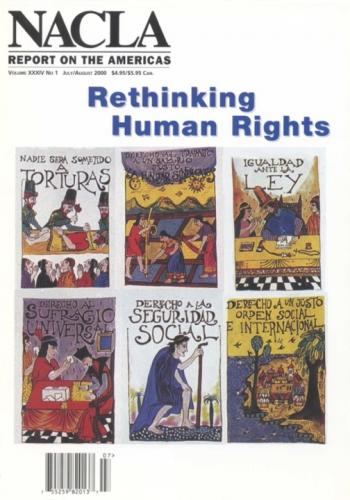Report
Over the past decade, many Latin American governments have adopted a formal commitment to women's equality. In some cases this has been institutionalized in specialized state machineries dedicated to women's issues, such as Brazil's National Council of Women's Rights (CNDM), Chile's National Women's Service (SERNAM), and more recently, Peru's Ministry for the Promotion of Women and Human Development (PROMUDEH).
At the beginning of the 1990s, in academic as well as political circles, it was agreed that Latin America, having closed a cycle of dictatorships and social revolutions, had entered a new period—perhaps a long and sustained one—of "democratic consolidation."
"The objective of memory is to highlight both the struggle of the dead and the nature of the powers that silenced them."
—Luis Carlos Restrepo [1]
On July 17, 1998, by a vote of 120 to 7 with 21 abstentions, members of the UN General Assembly, meeting in Rome, agreed to establish a permanent International Criminal Court (ICC) to try individuals for the most egregious crimes of international concern. The agreement, known as the "Rome Statute," will go into effect after 60 nations have ratified it.
Coletta Youngers & Jo-Marie Burt
In October 1996, after spending two-and-a-half years in prison on charges of terrorism, Emeteria Quispe Chillce was freed from the Chorrillos women's prison. She, along with 30 other men and women, were the first group of "inocentes"—individuals who were wrongly accused and convicted of terrorism or treason under Peru's harsh antiterrorism laws—to be granted a presidential pardon and set free.
Activists struggling for human rights have always aspired to global reach, but in the last generation that reach has begun to become a reality. The growth of global action corresponds to a new era of multilayered human rights threats, from legacies of authoritarianism to democratic deficits to the contradictions of globalization itself.
Like many progressive activist organizations found on the Web, the Internet homepage of the National Labor Committee (NLC), a New York-based NGO, opens with an "urgent action alert." In mid-June the bulletin detailed a struggle taking place at the Chentex factory in Nicaragua, a massive jeans-production plant in the country's Las Mercedes free-trade zone.
In 1987, as then-President Raúl Alfonsín was proposing a series of laws to abort trials of military officials accused of committing gross human rights abuses during the military dictatorship (1976-1983), the Argentine human rights movement organized the first "March Against Impunity."[1] Few Argentines understood what "impunity" meant back then, but now it is one of the most frequently used words in our vocabulary.
Much has been written about the sea change in international politics produced by the arrest in London and committal for extradition of former Chilean dictator Augusto Pinochet. Apart from strengthening international accountability, the Pinochet saga also brought justice closer in Chile itself.
Luis Sonihue died on May 12. He was an elderly man from the community of Esse'Eja in Madre de Dios, a department in the Peruvian Amazon, where he often went. A few days earlier, Sonihue had gone hunting.
A tightrope walker must maintain balance while moving steadfastly along a wire, with the constant danger of falling into the abyss below. This is precisely the nature of the challenge facing the Latin American human rights movement today: how to balance the work of promoting and defending human rights in the face of multiple demands, tensions and contradictions.[1]
Sara Méndez's story has all of the necessary components for a film about the military dictatorships of the Southern Cone: arbitrary arrest, torture, baby theft, a clandestine Operation Condor border crossing, a timid judiciary subject to military pressure, press censorship, and anonymity and impunity for the criminals involved.
As the increasingly independent judicial branch in Argentina has taken important steps to address the legacy of military human rights abuses, disquiet has grown within the military officer corps. A handful of judges have opened up a number of investigations into the fate of the disappeared.
Almost two decades after the wave of political transitions to "democracy" in South America, the effective protection of human rights continues to be an unfulfilled promise. Political regimes that are considered democratic because constitutional government has been restored and leaders compete freely in open elections are nevertheless marked by authoritarian legacies that remain embedded in state practices.
Dozens of mostly young people enter a middle-class neighborhood in Buenos Aires. The air is tense with anticipation, drums are sounding and whistles are blowing. But this is not carnival.
On May 25, Colombian journalist Jineth Bedoya was kidnapped, beaten and raped. She was my co-worker at the Bogotá daily, El Espectador.
In December 1986, amidst great tension and conflict, the Uruguayan Congress approved the so-called "Law Nullifying the State's Claim to Punish Certain Crimes"—known more commonly as the "impunity law"—effectively bringing an end to all trials against military and police officers implicated in human rights abuses during the military dictatorship (1973-1985).

